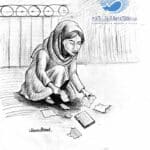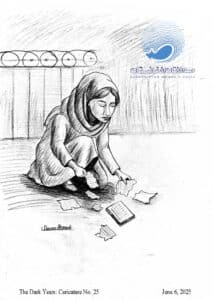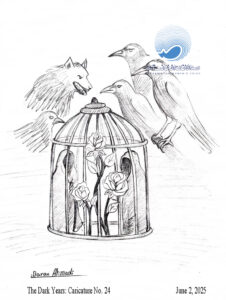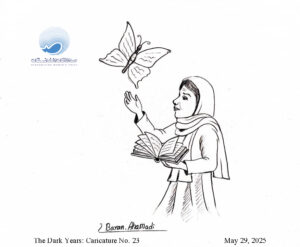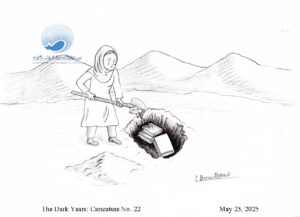Tales of the Dark Age (No. 56)
By Zahra Hossaini, translated by Rostam Safdari
As my studies neared their end, my anxiety grew stronger each day. My mind became increasingly chaotic, and I couldn’t find peace or sleep. A constant feeling of suffocation consumed me, as though the Taliban’s hands were tightening around my throat, punishing me with a slap across the face for a few strands of hair slipping out from beneath my scarf. At times, it felt as if I were standing directly in front of them—white turbans, long beards, glaring, angry eyes, Kalashnikov rifles aimed at me. Every time I snapped back to reality, my body would be cold, my breath short, and my heart racing.
These were the final days of my academic journey, marking the end of my time in Iran. I was overwhelmed with worry and dread. The weight of it all had stolen my sleep and peace of mind.
On my last day, under the burning summer sun, I walked through every corner of the dormitory, saying goodbye to a place that had been my refuge. If I ever felt lonely or homesick, the dorm was my safe haven. But now, I had nowhere to go. My time was up, and I had a confirmed departure.
I placed my suitcase in the middle of the room, staring at the clothes and belongings scattered around me, unsure of what to take and what to leave behind. It was a heart-breaking moment, leaving behind friends, memories, and everything that had brought me comfort and happiness.
As soon as I graduated from university in Iran, my student visa expired. I had no choice but to return to Afghanistan. The law in this country mandated that once studies were completed, we had to return home.
I had left Afghanistan before the Taliban took power, but their terrifying reputation always haunted me. I had heard of their brutality, particularly toward women, and the thought of returning to a country under their rule filled me with dread. How would I face them when I went back to Afghanistan?
I boarded a minibus, my body trembling, my chest tight with fear. The thought of traveling without a male guardian and potentially falling into the hands of the Taliban was my worst nightmare. As we crossed the border into Afghanistan, I held my breath, praying to get through the checkpoint without any trouble. The border officer stamped my passport, and no one questioned me about my guardian. But when we reached the checkpoint where they were checking bags, I froze. I huddled in the corner of the door, lowering my head and breathing as quietly as I could, praying I wouldn’t be noticed.
After checking the bags, it was time to question the passengers. My body was shaking. This was my first time facing the Taliban. They were rough-looking, wearing white turbans, holding Kalashnikovs, and shouting at people with no hint of kindness in their voices.
One of them approached the window beside me and asked sharply, “Who is your male guardian? Which of these men is your guardian?”
I froze, not knowing how to respond. I had no male guardian, and the passengers were just strangers I was traveling with. I was afraid that if I lied, they might ask for proof. So, I told the truth: I had no guardian with me, but my father was on his way from Afghanistan to meet me and accompany me for the rest of the journey.
The response was immediate. “Shameless woman! Sitting with strange men in the same car! Where is your guardian? You have none?” He shouted.
He ordered the driver to stop the bus. Despite my pleas that my father was on his way and would arrive soon, they ignored me and continued their insults. I was a woman, alone, in my country that no longer felt like home. It felt more like a prison than a homeland.
The Taliban member said, “A woman like you deserves to be stoned to death, and we should cut off your head. Your family has no honor, letting a young woman travel alone without a male guardian.”
Once, I had been an independent psychological counsellor, but now I was nothing but a “shameless woman” just because of my gender.
The other passengers were allowed to leave, but they told me, “You can’t go. We’re taking you to the police station, and we’ll deal with your guardian there.”
For what felt like an eternity, I sat in the front seat, trembling with fear as their words echoed in my mind. Tears streamed silently down my face, and the weight of dread crushed my chest.
After some time, the driver was ordered to stop at a checkpoint. He got off the bus, and another Taliban member got on. The driver continued on, and I became even more anxious as the bus veered off the main road. Where were they taking me? Why had we left the main route? Questions flooded my mind, but I could only sit there, helpless, waiting in fear.
Eventually, we arrived at a remote police station. I called my father, urging him to hurry, but it would take him hours to get there. My phone was off, and I was left alone, unable to reach anyone. All I could do was pray that the Taliban wouldn’t harm my father when he arrived.
For hours, I was consumed by terror, praying I would survive. I feared the Taliban would take out their anger on my father because I had travelled without a male guardian. There were no rules, no humanity in their actions — only cruelty.
When I finally saw my father, I rushed to him. He asked, “My daughter, what happened? What’s going on?”
I was pale and trembling, my eyes filled with tears. I could barely speak, but when I did, I said, “Father, they brought me here just because I didn’t have a male guardian.”
The Taliban insulted my elderly father, questioning why he had let me travel alone. They made him sign an agreement stating that I must never do it again. If I did, they said they would bring my father to the police station and flog him. They threatened that my punishment would be stoning to death or beheading.
After what felt like forever, they finally allowed us to leave. By the time we reached home, it was late, and I felt like an empty shell. My mother hugged me, but I couldn’t speak. My throat was tight with emotion.
That night felt like a nightmare. Every time I closed my eyes, I relived it. I was still at the police station, waiting for my fate to unfold, imagining the Taliban carrying out their threats.
That day still haunts me. Whenever I think back to it, I cry, wishing I had died instead of facing that tragic fate. The fear lingers, a trauma that may never fully heal. Perhaps one day, the Taliban will leave Afghanistan, but the pain and humiliation we endured will never be forgotten.
Editor’s Note: This story is based on an interview conducted by our journalist. Due to security concerns, the name and photo of the woman have not been published.
Note: Picture from Internet
